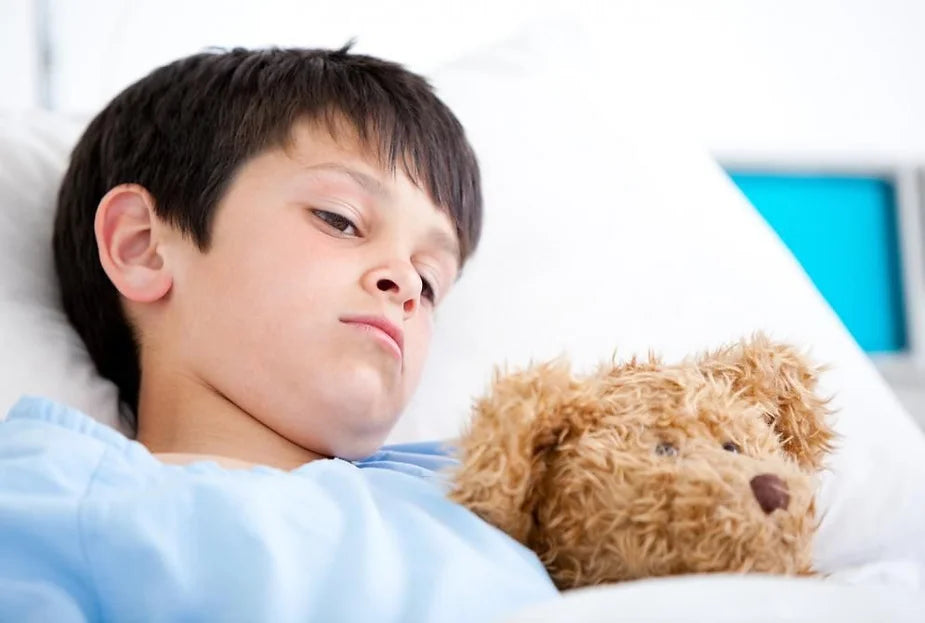About Influenza or Flu
Influenza or flu is caused by a virus. There are many different types of influenza viruses. The most common are types A and B.
Influenza viruses keep changing. This is why you can get the flu many times.
Influenza happens most often during winter. Occasionally, the virus becomes more widespread and causes an ‘outbreak’. When an outbreak happens, more people than normal get the flu.
Flu Symptoms
Flu symptoms in children are usually very similar to cold symptoms.
Flu symptoms include a runny nose, a sore throat, cough, fever, headache and muscle aches. Your child might be shivering and also feel very hot or very cold.
Flu might occasionally cause nausea, vomiting and diarrhoea.
Flu can come on very quickly and usually lasts 2-5 days, although the tiredness and cough can last for several weeks.
When people say they have the flu, they usually really have a cold. It’s hard to tell the symptoms apart. People with flu might have more muscle pain and chills.
Flu Complications
Flu is usually quite mild in children but can cause complications. These complications can sometimes be very serious.
The most common flu complication is pneumonia. A child with pneumonia will look unwell and might breathe faster and harder than normal.
Flu can be more serious in children with long-term (chronic) medical problems, pregnant women and other adults, especially old people.
Does your child need to see a Dr about flu?
You should take your child to the GP if:
- Your child can’t or won’t drink fluids
- Your child vomits frequently
- Your child doesn’t show some improvement within 48 hours
- You’re worried that your child is very unwell.
You should call an ambulance or go to a hospital emergency department if your child:
- Has an intense headache
- Is pale and sleepy
- Is breathing faster or harder than normal.
Flu treatment
There’s no cure for flu. There’s also no specific treatment that can make the flu go away more quickly.
All you can do for flu is treat the symptoms and try to make your child more comfortable:
- Give your child paracetamol as needed in recommended doses. This can help if your child is in pain or has a fever that’s making him uncomfortable.
- Encourage your child to drink lots of fluids so that she doesn’t get dehydrated. Warm drinks can ease a sore throat and dry mouth.
- It’s a good idea for your child to take things easy, but there’s no need for him to stay in bed. Let your child decide how active he wants to be.
- Don’t force your child to eat. She probably won’t be hungry, but her appetite will improve as she starts to feel better.
You should avoid:
- Cough medicines – your child is coughing because his windpipe is irritated or has a lot of mucus, and cough medicines won’t help with either of these issues
- Decongestants like Benadryl®, Bisolvon®, Demazin®, Dimetapp®, Duro-tuss™, Logicin®, Robitussin® and Sudafed® – these have side effects like rapid heart rate, jitteriness and insomnia, and can’t help with flu
- Antibiotics – flu is caused by a virus, so antibiotics won’t help and can even cause stomach upsets and diarrhoea.
There’s no need to stay away from dairy products – they don’t make extra mucus.
Flu prevention
The best way to avoid catching the flu is to wash your hands regularly with warm soapy water. Also try to keep your hands away from your eyes, nose and mouth.
Encourage family members to cover their mouths with a tissue, sleeve or elbow when coughing. Also encourage everyone to wash their hands after coughing and sneezing.
To minimise the chance of spreading your child’s flu to other people, keep your child away from child care, preschool or school while she’s sick.
Flu immunisation
Flu immunisation reduces the chance your child will get sick with flu, and it’s recommended that all children over six months be immunised against flu every year. If you want your child immunised against flu, talk to your doctor.
Flu immunisation is safe for all children over six months of age.
Flu immunisation is particularly important for high-risk children. This includes children under the age of five or children who have a chronic medical condition like a heart or lung disease.
Flu immunisation isn’t part of the National Immunisation Program (NIP) for most healthy children, which means it isn’t free. But some Aboriginal and Torres Strait Islander children and children who have certain medical conditions can get immunised for free under the NIP.
Reference: https://raisingchildren.net.au/guides/a-z-health-reference/influenza

